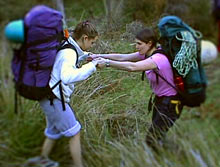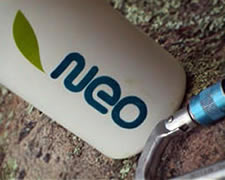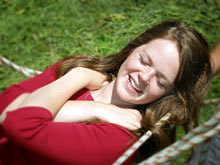You come to the wilderness to get in touch with yourself… You don't come out here to get away from it all, but to get back to it all. You don't get lost out here, you find yourself. You come home to what's important, you come home to yourself. Peter Dombrovskis,
Photographer (1945 – 1996) |
Adventure PsychologyAdventure Psychology is the study and clinical application of how adventurous experiences shape personality traits and psychological abilities that enhance adaptation to new or changing environments. This includes coping with adversity, building resilience, promoting healthy and effective psychological and social development. Key traits and abilities thought to be important include: risk-judgment and a capacity for risk-taking, emotional self-management, problem analysis and problem solving, including social and emotional problem solving, goal selection, goal focus and motivation, optimism, and a capacity to learn from failure and inter-personal feedback.
We cannot protect something we do not love, we cannot love what we do not know, and we cannot know what we do not see. And touch. And hear. - Richard LouvGo boldly, and wear your dirt with pride... |
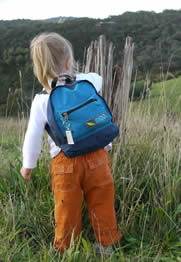 |
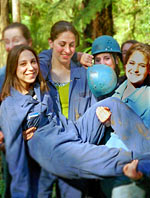 |
Wilderness Adventure Therapy®Wilderness Adventure Therapy (WAT) is the world's first evidence- based, manualised clinical intervention developed from the application of adventure psychology principles. These programs have been run in numerous clinical, community counselling and educational settings and with a wide range of client groups and diagnoses since 1992. We have an international reputation for our Australian Wilderness Adventure Therapy® Accreditation Scheme - again a world first. We currently run WAT programs in independent schools for at-risk students.
For many years we have been researching the benefits of WAT. These programs have been found to be as effective as the best |
known conventional treatments for mental health problems with adolescents. In fact, WAT holds many additional benefits such as enhancing resilience and normal development – see research findings.

Changes in Mental Health Symptoms - 3 Months and 2 Years Post-Treatment
[significant pre-post treatment reductions p=0.001, partial η2= .347]
In over 15 years in the field, we have an exceptional record of safe practice. Our field teams comprise Psychologists and fully-qualified and highly experienced adventure activity leaders. All staff have completed our leading, highly regarded Australian Wilderness Adventure Therapy® Accreditation Scheme. Programs typically run part-time for 8-10 weeks with 3 & 6 month follow-ups. Significant benefits in many areas can be achieved in this time. Neo provides all activity equipment and personal gear. When demand allows, we run our own self-referral WAT programs at Neo, but more often we run them within schools or youth organisations when requested. |
|
|
Download a flyer or WAT® Fact Sheet
For more information about WAT programs: |
Training and Accreditation in Wilderness Adventure Therapy
Research Results
WAT has consistently shown clear clinical evidence of its benefits in treating a range of psychological disorders and behavioural problems, including depression. Further, WAT enhances normal development and builds many protective factors in ways conventional therapy rarely does.
Download our 27 page summary:
Treatment Effectiveness of WAT®
Reports
- An Evaluation of the Barwon Health, Adolescent Mental Health Service - GO WEST Wilderness Adventure Therapy® program (2003). Neo Psychology Publication, Melbourne.
- The Systemic Wilderness Adventure Therapy®: Research And Development (SWATRAD) Project – Final Report (2002). Neo Psychology Publication, Melbourne.
-
Evaluation of the Typo Station Youth Program (2003): Download Report


Papers on Wilderness Adventure Therapy by Simon Crisp
Crisp, S.J.R. (2006). Taking a risk for adolescents: Wilderness adventure therapy. InPsych: Bulletin of the Australian Psychological Society, 28(4), 22-23.
Crisp, S.J.R. (2004). Envisioning the birth of a profession: A blue-print of evidence based, ethical, best practice, In S. Bandoroff & S. Newes (2004). Coming of Age: The Evolving Field of Adventure Therapy. Association for Experiential Education: Boulder, CO.
Crisp, S.J.R. (2003). Publishing spurious research findings won't build a profession: Response to Brand's (2001) evaluation of the Wilderness Enhanced Program. Australian Journal of Outdoor Education, Vol 7(2), 52-57.
Crisp, S.J.R. O'Donnell, M.J., Kingston, L., Poot, A. & Thomas, N. (2000). Innovative Multi-modal Day-patient Treatment for Severely Disordered At Risk Adolescents. In N.N. Singh, J.P. Leung, & A.N. Singh (Eds) International Perspectives on Child & Adolescent Mental Health, 2000, Elsevier Publications.
Crisp, S.J.R. (1998). International models of best practice in wilderness and adventure therapy, In C.M. Itin, Exploring the Boundaries of Adventure Therapy: International Perspectives, Boulder, CO: Association for Experiential Education.
Crisp, S.J.R. & O'Donnell, M. (1998). Wilderness Adventure Therapy® in developmental psychiatry, The Australian Journal of Outdoor Education. Vol 3, (1), 47-57.
Crisp, S.J.R. & Aunger, N. (1998). Wilderness Adventure Therapy® in adolescent psychiatry: Case study of a 15 year old girl with social and psychological problems, The Australian Journal of Outdoor Education, 2 (3), 17-25.
Crisp, S.J.R. (1997) Book Review: Wilderness Therapy for Women: The Power of Adventure, E. Cole, E. Erdman, & E.D. Rothblum (Eds), Australian Psychologist, 32,(3), 216-217.
Crisp, S.J.R. (1997). Therapeutic adventure around the world: A Churchill Fellowship investigation into wilderness and adventure therapy and related mental health programs, Journeys, 2 (3), 9-11.
Crisp, S.J.R. (1996). What Makes Wilderness Adventure Therapeutic? The Need for Broader Frameworks. The Australian Journal of Outdoor Education, 2, (1), 9-18.


